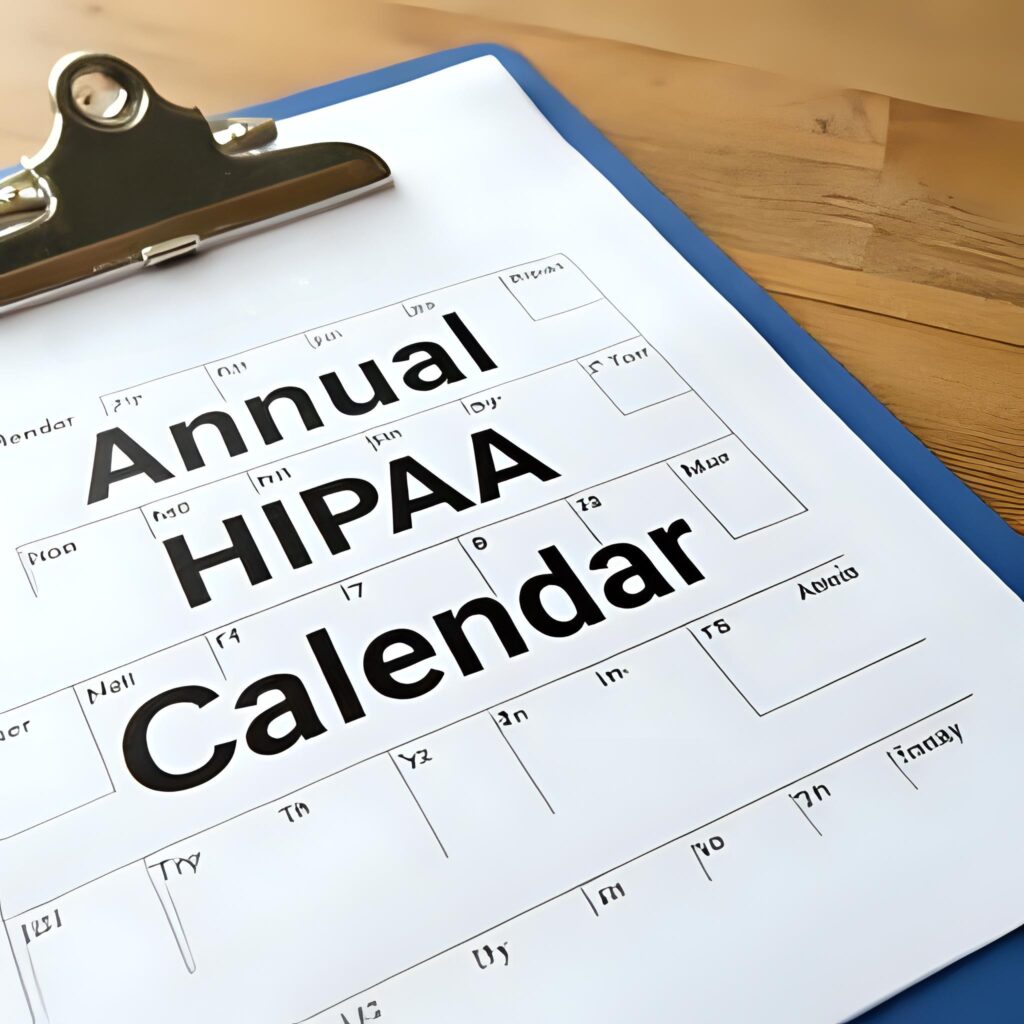
Can You Prove You Are Compliant with
HIPAA Laws?
It’s not enough to “do your best” with HIPAA. You have to be able to prove it on paper.
Regulators, licensing boards, and insurance companies all expect documented evidence that you have reviewed, updated, and enforced compliance tasks throughout the year.
Without proof, you are considered out of compliance even if you thought you were
following the rules.
Why You Need This Calendar
Most practices don’t fail HIPAA because of one major mistake.
They fail because they forget the routine tasks:
Staff trainings never logged
Annual audits skipped
Policies never reviewed
Website checks ignored
Regulators don’t care if you were busy. If it’s not documented, it didn’t happen and that means fines, investigations, and potential loss of your license.
What It Is?
The Annual HIPAA Compliance Calendar (Federal Edition) is a one-page, editable calendar that breaks HIPAA requirements into monthly tasks you can actually manage. Instead of scrambling at the end of the year, you’ll have a clear plan that keeps you
audit-ready.
Compliance Is About Proving It, Not Just Saying It
Why Following the Annual HIPAA Compliance
Calendar Matters
Here’s a super-informative, educational list you can use directly on the page:
1️⃣ HIPAA Requires Ongoing Proof, Not One-Time Setup
Written policies are only the starting point. Federal law (45 CFR §164.308) requires regular reviews and updates of safeguards.
If you can’t show logs of activity, OCR considers you noncompliant.
2️⃣ Annual Risk Assessments Are Mandatory
HIPAA requires you to conduct an annual evaluation of technical, administrative, and physical safeguards.
Skipping this step is one of the most common reasons small practices are fined.
3️⃣ Staff Training Must Be Repeated and Logged
HIPAA requires initial and ongoing training. Many states mandate annual refreshers.
If you can’t produce a training log, you can’t prove compliance.

4️⃣ Policies and Forms Must Stay Current
Notices of Privacy Practices, consent forms, and intake paperwork must be updated as laws change.
State rules on minor consent, telehealth, or digital privacy often update yearly.
5️⃣ State Laws Override HIPAA
HIPAA sets the floor, but states often impose stricter rules such as retention timelines, breach notifications, and Medicaid documentation.
Following only federal law still leaves you vulnerable.
6️⃣ Documentation Is Your Only Defense
In an audit, regulators will not take your word for it. They will ask for:
- BAA copies
- Risk assessment logs
- Breach drills
- Training records
If you cannot produce them, the assumption is negligence.
7️⃣ Small Practices Are the Primary Target
OCR and state boards focus on private practices because they know compliance is often inconsistent.
Most investigations are triggered by client complaints, not hackers.
8️⃣ Proactive Planning Prevents Crisis Compliance
Without a plan, practices only address compliance after a complaint or investigation.
Regulators do not accept “I was busy.” They expect evidence that you were proactive.
9️⃣ Protects Your License and Reputation
Noncompliance is not just about fines. It can trigger board discipline, malpractice risk, and client distrust.
Using a calendar shows you take compliance seriously and builds credibility with clients and payors.
🔟 Breaks HIPAA Into Manageable Steps
Instead of overwhelming checklists, a calendar spreads tasks out monthly.
You know exactly what to do, when to do it, and how to log it.
Who It’s For
Solo providers who need a simple, month-by-month compliance plan
Group practices that want accountability across staff
Supervisors who must document compliance oversight year-round
How It Helps
Keeps you organized and proactive instead of reactive
Builds a proof of compliance trail for audits or board reviews
Turns HIPAA into small, monthly action steps instead of overwhelming tasks
Pricing
Value: $97
Price: $49

